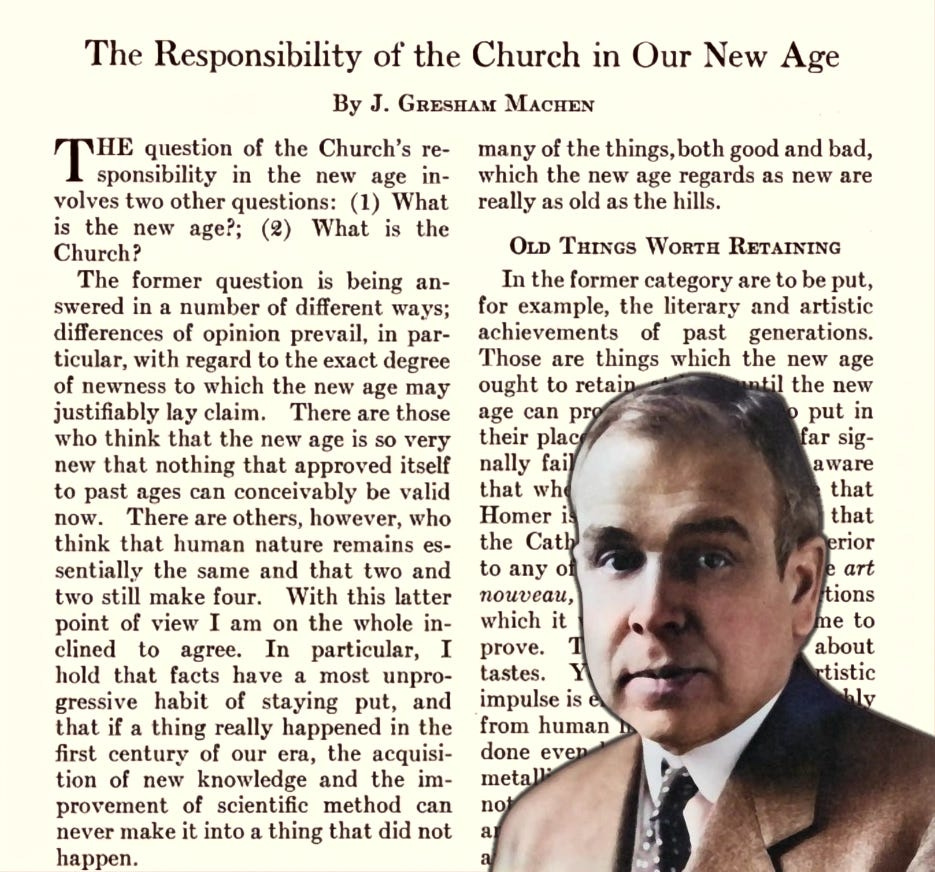Things Horizontal & Things Unseen
Working through a landmark Machen article, part 4
Put no confidence in princes,
Nor for help on man depend;
He shall die, to dust returning,
And his purposes shall end.
(setting of Psalm 146)
MACHEN LAMENTS the modern world’s man-ward, worldly, horizontal, temporal, things-seen focus:
If that battle is lost, if collectivism finally triumphs, if we come to live in a world where recreation as well as labor is prescribed for us by experts appointed by the state, if the sweetness and the sorrows of family relationships are alike eliminated and liberty becomes a thing of the past, we ought to place the blame for this sad denouement—for this sad result of all the pathetic strivings of the human race —exactly where it belongs. And it does not belong to the external conditions of modern life. I know that there are those who say that it does belong there; I know that there are those who tell us that individualism is impossible in an industrial age. But I do not believe them for one moment. Unquestionably, industrialism, with the accompanying achievements of modern science in both the physical and the social realm, does constitute a great temptation to destroy freedom; but temptation is not compulsion, and of real compulsion there is none.
No, my friends, there is no real reason for mankind to surrender to the machine. If liberty is crushed out, if standardization has its perfect work, if the worst of all tyrannies, the tyranny of the expert, becomes universal, if the finer aspirations of humanity give way to drab efficiency, do not blame the external conditions in the world today. If human life becomes mechanized, do not blame the machine. Put the blame exactly where it belongs—upon the soul of man.
Is it not in general within that realm of the soul of man that the evils of society have their origin today? We have developed a vast and rather wonderful machinery—the machinery of our modern life. For some reason, it has recently ceased to function.1 The experts are busily cranking the engine, as I used to do with my Ford car in the heroic days when a Ford was still a Ford. They are wondering why the engine does not start. They are giving learned explanations of its failure to do so; they are adducing the most intricate principles of dynamics. It is all very instructive, no doubt. But the real explanation is much simpler. It is simply that the driver of the car has forgotten to turn on the switch. The real trouble with the engine of modern society is that it is not producing a spark. The real trouble lies in that unseen realm which is found within the soul of man.
That realm cannot be neglected even in a time of immediate physical distress like the present. I do not know in detail how this physical distress is to be relieved. I would to God that I did. But one thing I do know; it will never be relieved if, in our eagerness to relieve it, we neglect the unseen things. It is not practical to be merely practical men; man cannot successfully be treated as a machine; even the physical welfare of humanity cannot be attained if we make that the supreme object of our pursuit; even in a day when so many material problems are pressing for our attention, we cannot neglect the evils of the soul.
His primary concern in 1933 was technology, mechanization, and centralized control—what would later be called technocracy. Today, all modern leaders and politicians are technocrats of one sort or another. Government is a vast machine supported by a complex messaging system. The public square is digital and reality is largely virtual. People are just things in the internet of things. But reality cannot be firewalled or blocked or downloaded. And real reality involves things eternal and unseen. It is necessarily vertical. Machen would exhort us (90 years later) not to trust in princes, technocrats, machines, software, or networks. He would tell us to seek refuge and refreshment in the one place where vertical and horizontal meet in real blessing: the church. And that will be Machen’s concern (and ours) for the remainder of this series on “The Responsibility of the Church in Our New Age.”
Read The Responsibility of the Church in Our New Age
Listen to a fine reading of the article (39 minutes) by Bob Tarullo
Stay tuned for future installments - by Brad Isbell
READ PART 3
Here he surely refers to the economic and resultant social problems of the Great Depression.



